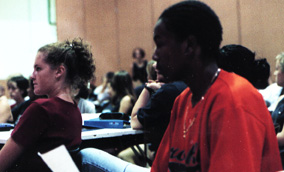
Things to
Think About
On November 24, 1989 the Canadian House of Commons
unanimously passed a resolution that: "this House seek(s) to
achieve the goal of
eliminating
poverty among
Canadian children by the year 2000." There are now
500,000 MORE poor
children. (Campaign 2000, Report Card, 1997)
Before we figure out how we will fight poverty we first
have to figure out what poverty is:
 Have
you ever felt ashamed or been teased by your friends about
wearing the same clothes over again because your family
didn't have the money to get you new ones? Have
you ever felt ashamed or been teased by your friends about
wearing the same clothes over again because your family
didn't have the money to get you new ones?
 Have
you ever had to miss going out with your friends because you
didn't have money to do what they wanted to do? Have
you ever had to miss going out with your friends because you
didn't have money to do what they wanted to do?
 Have
you ever felt afraid to go home because it was not a safe
place to be? Have
you ever felt afraid to go home because it was not a safe
place to be?
 Do
you ever feel ashamed about your family because they are on
welfare? Do
you ever feel ashamed about your family because they are on
welfare?
These are just a few examples of people's experiences of
poverty. But poverty goes beyond money, which some people
don't know. When we think of poverty often we imagine
famines in Africa, homelessness and destitution. That is one
extreme of poverty.
Being poor is also about having parents who are not
around because they are working to try and provide for their
kids. They may not have the time or the energy to be
involved in your life. It may also be about not having
parents, growing up in foster care or living in a group
home. Poverty is also emotional: some people have their
material needs provided for (food, clothing, shelter) but
may be emotionally neglected.
Often being poor is about not even knowing what is
available to you. Poverty can limit your ability to dream or
imagine a better life for yourself.

More Food
for Thought
Children who have access to a computer at home are at an
advantage academically and socially. They learn to be
comfortable with new technology. They can access information
for homework assignments and gain better skills when job
hunting.
Children whose parents read to them have stronger written
and verbal skills and are at an advantage when they begin
school.
Recreation is one of the ways children build confidence,
independence and learn how to interact with others.
Children, who don't have access to recreational activities
such as playing sports, taking swimming lessons or learning
a musical instrument, are often weaker in these areas.
Children whose parents show an interest in their
education and help them in their homework do better in
school.
Travel is one of the ways people learn about new cultures
and experience adventure. Children whose parents can't
afford vacations have less opportunity to see new places,
meet new people and experience new cultures.
Children who have at least one caring and consistent
adult in their life are more resilient, deal with stress
better and have higher self-esteem.
|











